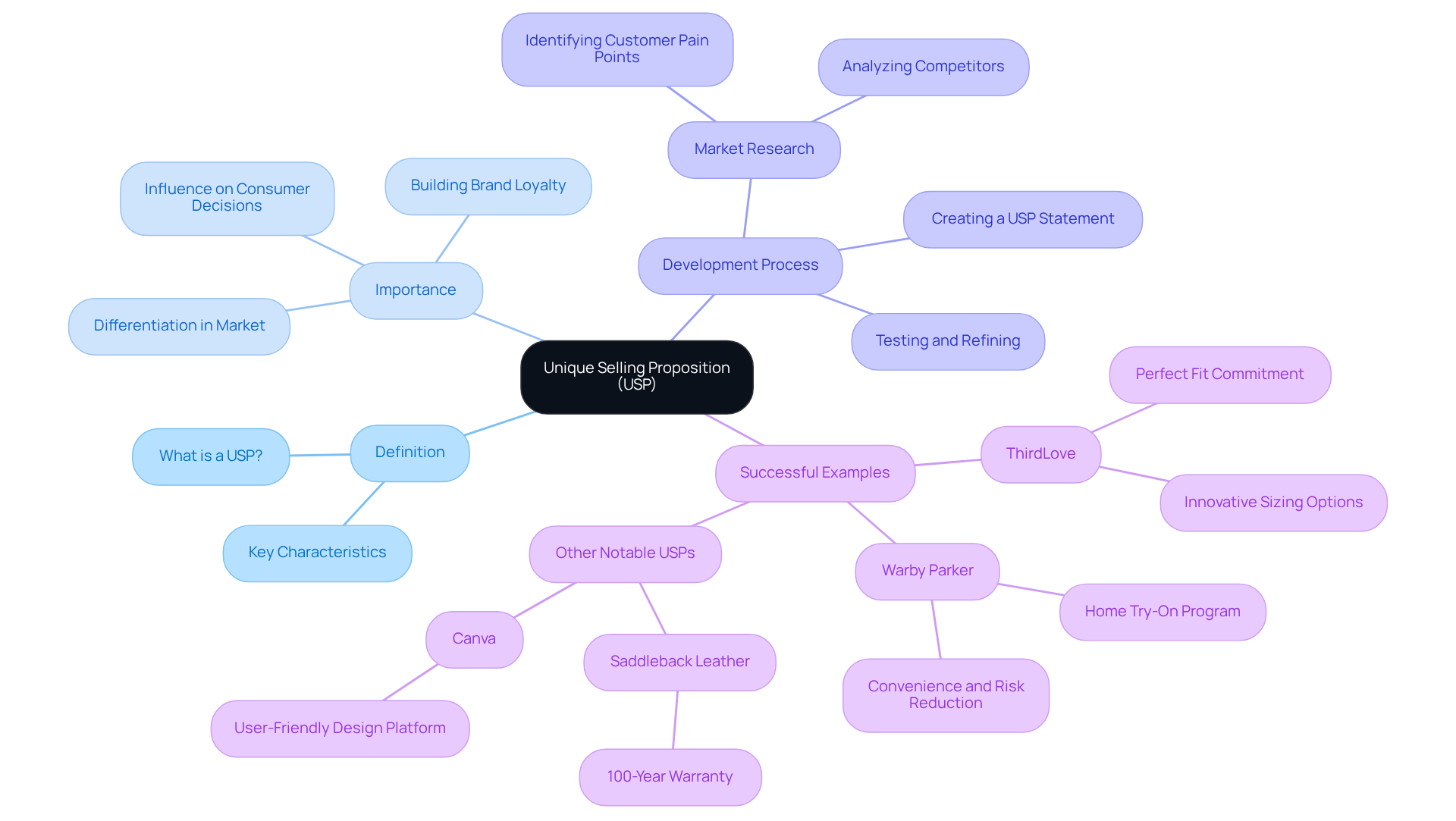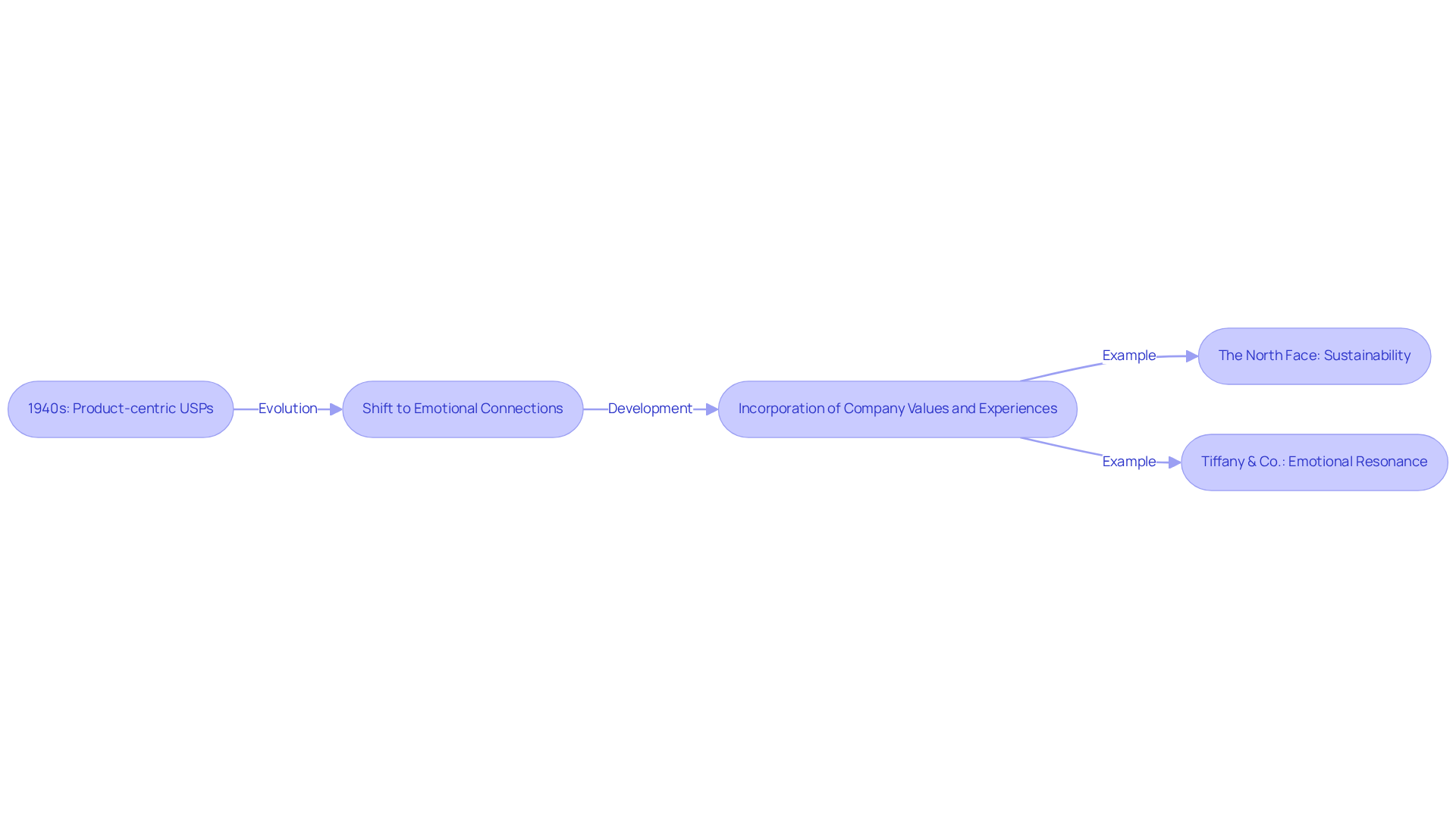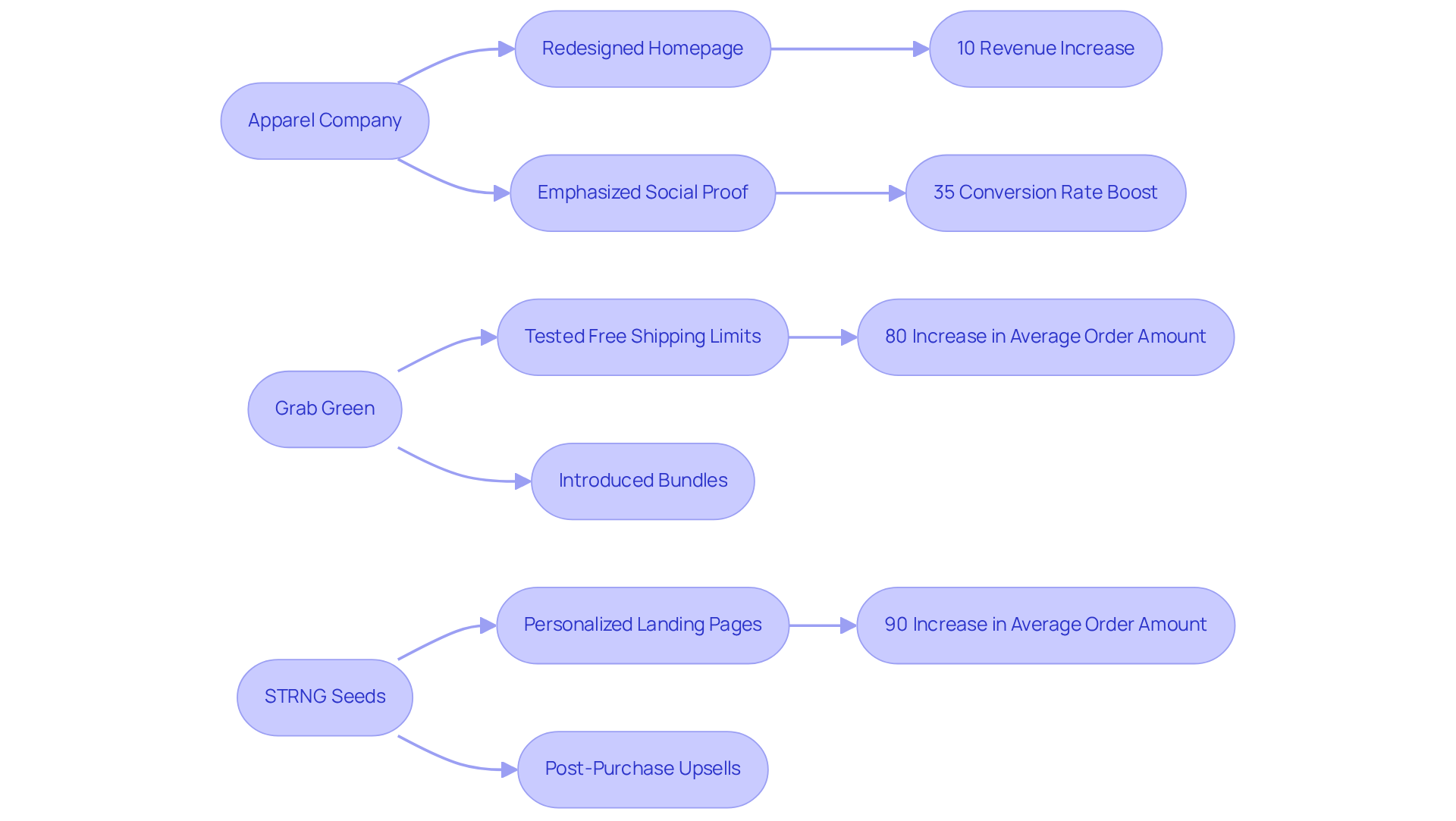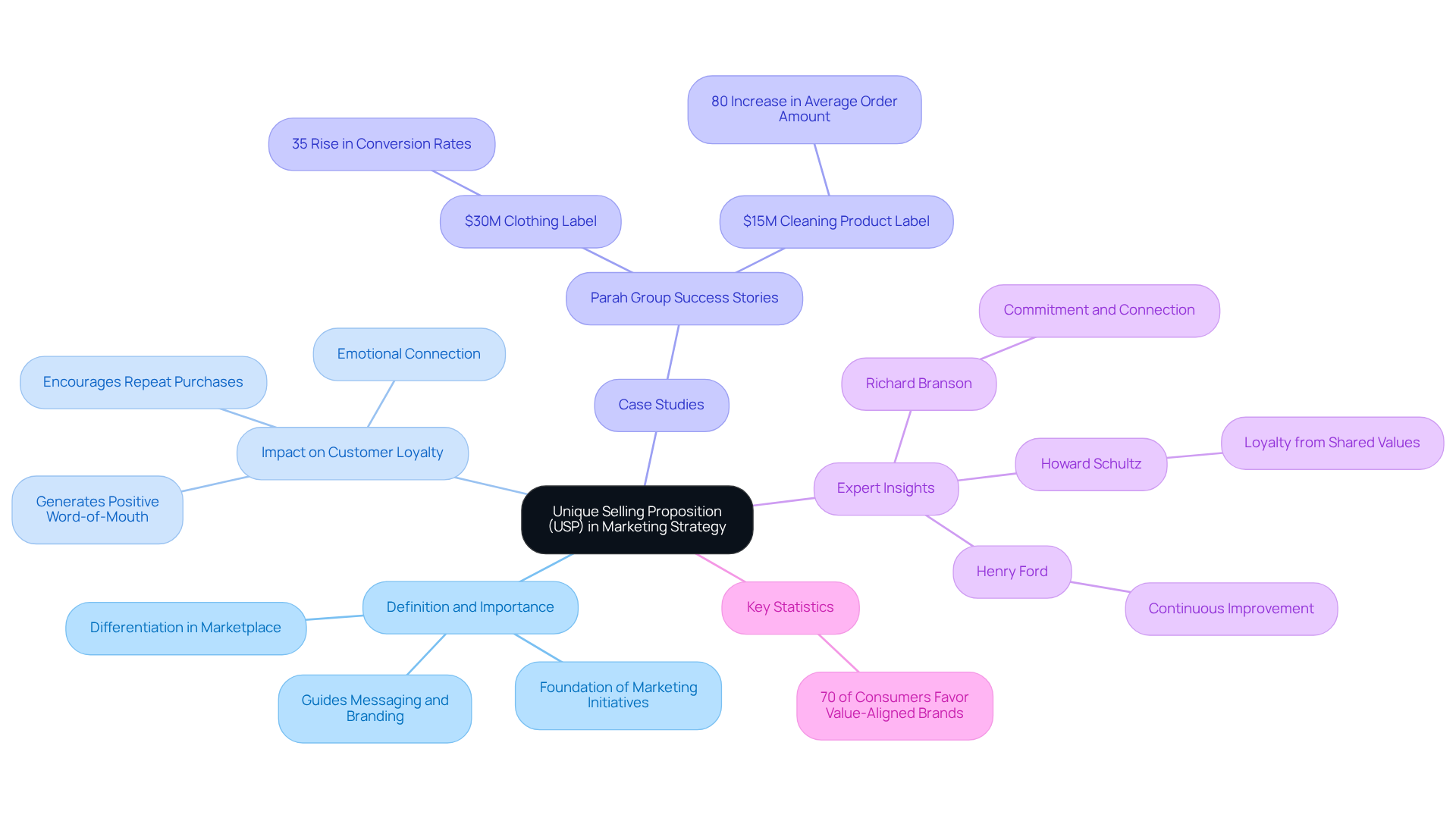
Overview
The Unique Selling Proposition (USP) in marketing represents the distinct value that differentiates a product or brand from its competitors. This differentiation is crucial for direct-to-consumer (DTC) brands aiming to excel in an increasingly saturated market. Effective USPs not only foster customer loyalty but also drive sales by creating emotional connections and delivering clear messaging.
Successful case studies illustrate how companies have enhanced their marketing strategies by emphasizing their unique offerings, demonstrating the tangible benefits of a well-defined USP.
In conclusion, DTC brands must prioritize their USPs to thrive in this competitive landscape.
Introduction
Understanding the Unique Selling Proposition (USP) is essential for brands navigating the competitive landscape of direct-to-consumer (DTC) marketing. A well-crafted USP not only differentiates a company from its rivals but also resonates with consumers on a deeper level, driving loyalty and enhancing sales.
However, as markets become increasingly saturated, the challenge lies in developing a USP that stands out and effectively communicates a brand's unique value. This is where DTC brands must focus their efforts. How can they create compelling propositions that not only attract customers but also foster lasting relationships? By addressing this question, brands can unlock the potential of their unique offerings and position themselves for success in a crowded marketplace.
Define Unique Selling Proposition (USP) in Marketing
A Unique Selling Proposition, or USP means in marketing, serves as the defining characteristic that sets a product or company apart from its competitors. It articulates the distinct value an organization delivers to its customers, directly addressing their needs or pain points. For direct-to-consumer (DTC) companies, understanding what USP means in marketing is crucial for differentiating themselves in a saturated market, as it significantly influences consumer purchasing decisions. A compelling USP means in marketing by highlighting what makes a product unique and articulating why that uniqueness matters to the target audience, thereby fostering brand loyalty and enhancing conversion rates.
To develop a relevant USP, conducting thorough market research to identify customer pain points is essential. Successful examples abound, such as:
- ThirdLove's commitment to perfect fit through innovative sizing options
- Warby Parker's home try-on program
Both effectively communicate their unique value propositions and resonate deeply with consumers. Additionally, Parah Group's case studies illustrate how companies can refine their USPs through strategic conversion rate optimization. For instance, a $30 million apparel company enhanced its conversion rate by 35% and revenue per visitor by 10% after redesigning its homepage to emphasize social proof and optimize product pricing. Similarly, Grab Green, a $15 million cleaning product company, saw an 80% increase in average order value by implementing bundles and multi-packs, showcasing the transformative impact of value propositions in driving larger purchases.
Consistency in messaging across all marketing channels reinforces what USP means in marketing, ensuring it is integrated into every facet of the business. By clearly defining and continuously evaluating their USPs, DTC companies can forge a strong connection with their audience, ultimately driving sales and fostering growth.

Explore the Historical Context and Evolution of USP
The concept of Unique Selling Proposition (USP), which is what USP means in marketing, was popularized in the 1940s by advertising pioneer Rosser Reeves, who underscored the necessity of a clear and compelling message that distinguishes a product. Initially, USPs were predominantly product-centric, emphasizing tangible features and benefits. However, as markets became increasingly saturated and consumer preferences evolved, the focus shifted towards fostering emotional connections and engaging storytelling. Today, when we say USP means in marketing, it encompasses not only product attributes but also company values, customer experiences, and social responsibility. This multifaceted approach serves as a vital tool for DTC companies striving to resonate deeply with their audience.
Case studies illustrate this evolution effectively. For example, companies such as The North Face have effectively incorporated sustainability into their unique selling propositions, attracting eco-friendly consumers. Similarly, Tiffany & Co. leverages emotional resonance by framing its products within narratives of love and commitment, which is crucial in the luxury market. These examples highlight the transition from merely promoting product features to creating meaningful connections that enhance customer loyalty.
Expert opinions further reinforce this shift. Marketing thought leaders stress that effective USPs must now reflect the 'why' behind a company, aligning with Simon Sinek's philosophy that "People don’t buy what you do; they buy why you do it." This evolution signifies a broader trend in advertising, where emotional engagement and storytelling are paramount, allowing companies to stand out in a crowded marketplace. However, creating a compelling USP means in marketing also presents challenges, such as ensuring uniqueness in saturated markets and avoiding overpromises, which are critical considerations for companies aiming to develop effective marketing strategies.

Examine Real-World Examples of Unique Selling Propositions
Numerous DTC companies have effectively harnessed the concept of what USP means in marketing, creating unique selling propositions that resonate deeply with their target audiences. A $30M apparel company, for instance, partnered with Parah Group to tackle low conversion rates by redesigning their homepage to emphasize social proof and reviews. This strategic move significantly improved their revenue per visitor by 10% and boosted the conversion rate by 35%. Such an approach not only simplifies the purchasing process but also appeals to budget-conscious consumers, fostering loyalty and repeat purchases.
Similarly, Grab Green, a cleaning product company generating $15M in revenue, implemented tactics like testing free shipping limits and introducing bundles to encourage larger purchases. This led to an impressive 80% increase in the average order amount. STRNG Seeds, a rapidly expanding DTC cannabis company, enhanced their average order amounts by 90% through personalized landing pages and post-purchase upsells. These well-defined USPs, which illustrate what USP means in marketing, not only attract clients but also cultivate loyalty, as evidenced by strong retention rates associated with effective USPs.
Indeed, companies that articulate clear and compelling USPs often reflect what USP means in marketing, frequently observing improved loyalty among clients and heightened lifetime value. This underscores the importance of a strategic approach to USP means in marketing development in the competitive DTC market. By implementing comprehensive conversion rate optimization (CRO) strategies, as illustrated in these case studies, DTC companies can maximize profitability while ensuring their USPs are effectively communicated and aligned with consumer expectations.

Understand the Importance of USP in Marketing Strategy
The significance of a Unique Selling Proposition (USP) in a marketing strategy highlights what USP means in marketing. A clearly defined USP means in marketing serves as the foundation of all marketing initiatives, guiding messaging, branding, and client engagement efforts. For direct-to-consumer (DTC) companies, knowing what USP means in marketing allows them to effectively convey their distinct offerings and stand out in a crowded marketplace. A compelling USP fosters loyalty among clients by establishing an emotional connection with the company, encourages repeat purchases, and generates positive word-of-mouth referrals. In a landscape where consumers face an overwhelming array of choices, recognizing what USP means in marketing is vital for driving conversions and ensuring sustainable growth.
Expert insights underscore this notion; Richard Branson emphasizes that successful branding hinges on commitment and connection, which a strong USP inherently provides. Furthermore, research shows that more than 70 percent of worldwide consumers favor companies that match their values, emphasizing the significance of a USP that connects on a personal level.
Case studies from Parah Group demonstrate the effectiveness of a strong USP in enhancing client loyalty and driving revenue growth. A $30M clothing label that collaborated with Parah Group experienced a 35% rise in conversion rates after applying strategies that emphasized their distinctive offerings and social proof, such as displaying client reviews and enhancing product presentation. Similarly, a $15M cleaning product label enhanced their average order amount (AOV) by 80% through focused messaging and propositions that resonated with their customers, including item bundling and highlighting savings on larger purchases. These results illustrate that companies that effectively express their unique offerings often experience heightened engagement and repeat purchases, as Howard Schultz asserts that loyalty arises from shared values. Furthermore, ongoing enhancement and reliability in fulfilling the USP are crucial for strengthening reputation, as noted by Henry Ford.
Ultimately, a well-defined USP means in marketing not only guides branding and customer engagement strategies but also acts as a critical tool for DTC brands aiming to cultivate lasting relationships with their customers.

Conclusion
Understanding the significance of a Unique Selling Proposition (USP) in marketing is essential for direct-to-consumer (DTC) brands aiming to carve out a niche in competitive markets. A well-defined USP not only highlights what sets a product apart but also connects emotionally with consumers, ultimately driving loyalty and enhancing conversion rates. By articulating the unique value they offer, DTC companies can effectively differentiate themselves and foster lasting relationships with their audience.
The importance of a strong USP is illustrated through various key points:
- The historical evolution of the concept has shifted from product-centric features to emotionally resonant narratives.
- Real-world examples of successful DTC brands like ThirdLove and Warby Parker showcase how a compelling USP can lead to increased customer engagement and revenue growth.
- Case studies further emphasize the transformative power of a well-communicated USP, demonstrating its role in driving significant improvements in conversion rates and average order values.
Ultimately, the ability to create and maintain a powerful USP is crucial for DTC brands seeking sustainable growth in a crowded marketplace. By focusing on what makes their offerings unique and aligning with consumer values, these companies can enhance their marketing strategies and build a loyal customer base. Embracing the principles of a strong USP means recognizing its potential to influence consumer behavior and drive long-term success in the ever-evolving landscape of marketing.
Frequently Asked Questions
What is a Unique Selling Proposition (USP) in marketing?
A Unique Selling Proposition (USP) is a defining characteristic that sets a product or company apart from its competitors. It articulates the distinct value an organization delivers to its customers, addressing their needs or pain points.
Why is understanding USP important for direct-to-consumer (DTC) companies?
Understanding USP is crucial for DTC companies because it helps them differentiate themselves in a saturated market, significantly influencing consumer purchasing decisions and fostering brand loyalty.
How can a compelling USP impact consumer behavior?
A compelling USP highlights what makes a product unique and explains why that uniqueness matters to the target audience, which can enhance conversion rates and build brand loyalty.
What steps should be taken to develop a relevant USP?
To develop a relevant USP, it is essential to conduct thorough market research to identify customer pain points and understand what unique value the product can offer.
Can you provide examples of successful USPs?
Successful examples include ThirdLove's commitment to perfect fit through innovative sizing options and Warby Parker's home try-on program, both of which effectively communicate their unique value propositions.
How can companies refine their USPs?
Companies can refine their USPs through strategic conversion rate optimization, as illustrated by case studies from Parah Group, where companies enhanced their conversion rates and revenue by emphasizing social proof and optimizing product pricing.
What impact can a well-defined USP have on sales?
A well-defined USP can drive larger purchases and increase average order value, as seen with companies like Grab Green, which implemented bundles and multi-packs to achieve an 80% increase in average order value.
How important is consistency in messaging regarding USP?
Consistency in messaging across all marketing channels is vital, as it reinforces the USP and ensures it is integrated into every facet of the business, helping to forge a strong connection with the audience.
How can DTC companies maintain their USPs over time?
DTC companies can maintain their USPs by clearly defining and continuously evaluating them to adapt to changing market conditions and consumer needs, ultimately driving sales and fostering growth.
FAQs











